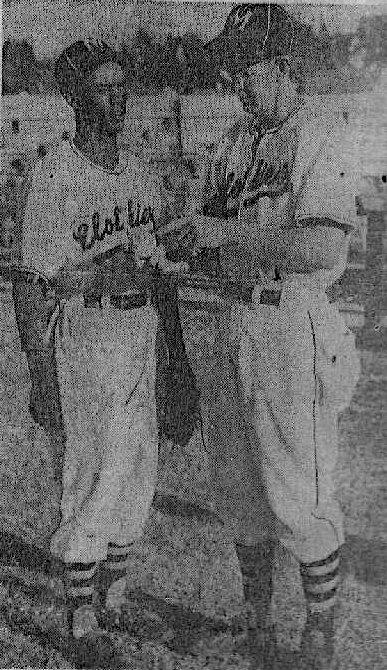When 24-year-old “Mickey” Stubblefield took the mound for the Mayfield Clothiers on the night of June 26, 1952, against the Paducah Chiefs, he became the first African-American player in the history of the Kitty League.
Born Wilker Harrison Thelbert Stubblefield in Mayfield, Kentucky, on February 26, 1926, he was the son of Harrison Shelby Stubblefield and Mary Elizabeth (Wilker) Stubblefield. He played baseball at an early age. A group of local white children who styled themselves the “South Seventh Street Sluggers” added him to their sandlot team. They played on a vacant lot at the corner of South Seventh and Walnut streets. Because of his small stature and the way his oversized black baseball cleats looked on his feet, they nicknamed him “Mickey” (for the cartoon character Mickey Mouse).
Stubblefield served his country in the U.S. Navy during World War II. Afterward, he began his professional career with the Omaha Rockets in 1947. It was an independent club that played against other African-American teams. Mickey pitched the next two seasons for the Kansas City Monarchs and reportedly won 20 games in 1948. He learned how to throw a curve ball from his teammate, the legendary Negro Leagues pitcher Satchel Paige. He adapted Paige’s pitching delivery into his own and became known as “Lil’ Satch.”
Stubblefield played for McCook in the Nebraska State League in 1950, finishing with a 13-6 record. Two years later, he returned home to Mayfield. He worked at the local Dr. Pepper Bottling Company and pitched for a local semi-pro club called the Black Hawks.
Meanwhile, the Mayfield Clothiers were in the Kitty League cellar with a 20-31 record in the spring of 1952. Pittsburgh Pirates scouts Bill Burwell and Frank Rickey — whose brother Branch Rickey had signed Jackie Robinson and broken the color barrier in major-league baseball five years earlier — were in town signing local talent for the struggling club. They approached Stubblefield about playing for the Clothiers.
By signing Mickey Stubblefield to a player contract on June 26, 1952, Mayfield had integrated the Kitty League. President Shelby Peace sent a hasty inquiry to the seven other clubs for their positions on the controversial decision. Three teams (Fulton, Jackson, and Union City) opposed integration, but they would do nothing to stop it. Hopkinsville felt it would negatively affect attendance there. A city ordinance in Madisonville prohibited blacks from playing at their municipal ballpark. “Actually, none of the club owners are in favor of Negroes in the league,” stated Peace matter-of-factly, “but there is no law that would prevent it except in parks that are municipally owned.”

About 1,500 fans — black and white — packed War Memorial Park and overflowed into the adjacent football grandstand in right field for Stubblefield’s historic debut. They gave him a standing ovation to start the game. He struck out the first batter he faced, Paducah third baseman Russ Davis. Mickey had six strikeouts, five walks, and scattered six hits in the complete game victory, winning 5-4. “It was a thrill to me because I was black, back home, and because I won the game,” he recalled.

Mayfield manager Francis “Red” Barrett used Stubblefield as both a starter and a reliever. Except for a start at Paducah on August 2, he pitched only in Mayfield. (He was scheduled to pitch a game at Jackson four days later, but they postponed it due to rain.) No doubt there was racial prejudice in every town and he was segregated from his teammates. “It was rough,” he later recalled. “But it didn’t bother me, what they said. And I was called everything.” He remained with the Clothiers the rest of the season and pitched his last game on August 28, a 6-3 loss to the Madisonville Miners.
Mayfield released Stubblefield before the 1953 season. The reported reason was the unwillingness of Fulton, Hopkinsville, Madisonville, and Owensboro to let him pitch there. Yet the other league towns — Jackson, Paducah, and Union City — wanted him because he boosted their attendance.
The Pittsburgh Pirates sent Mickey to their Class C club at Duluth, Minnesota instead. By this point, however, he was experiencing arm problems and pitched only 17 innings before retiring from professional baseball.
Mickey Stubblefield died in Smyrna, Georgia, on February 19, 2013, at 86.

this is great work
LikeLiked by 1 person